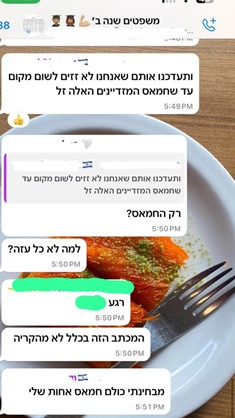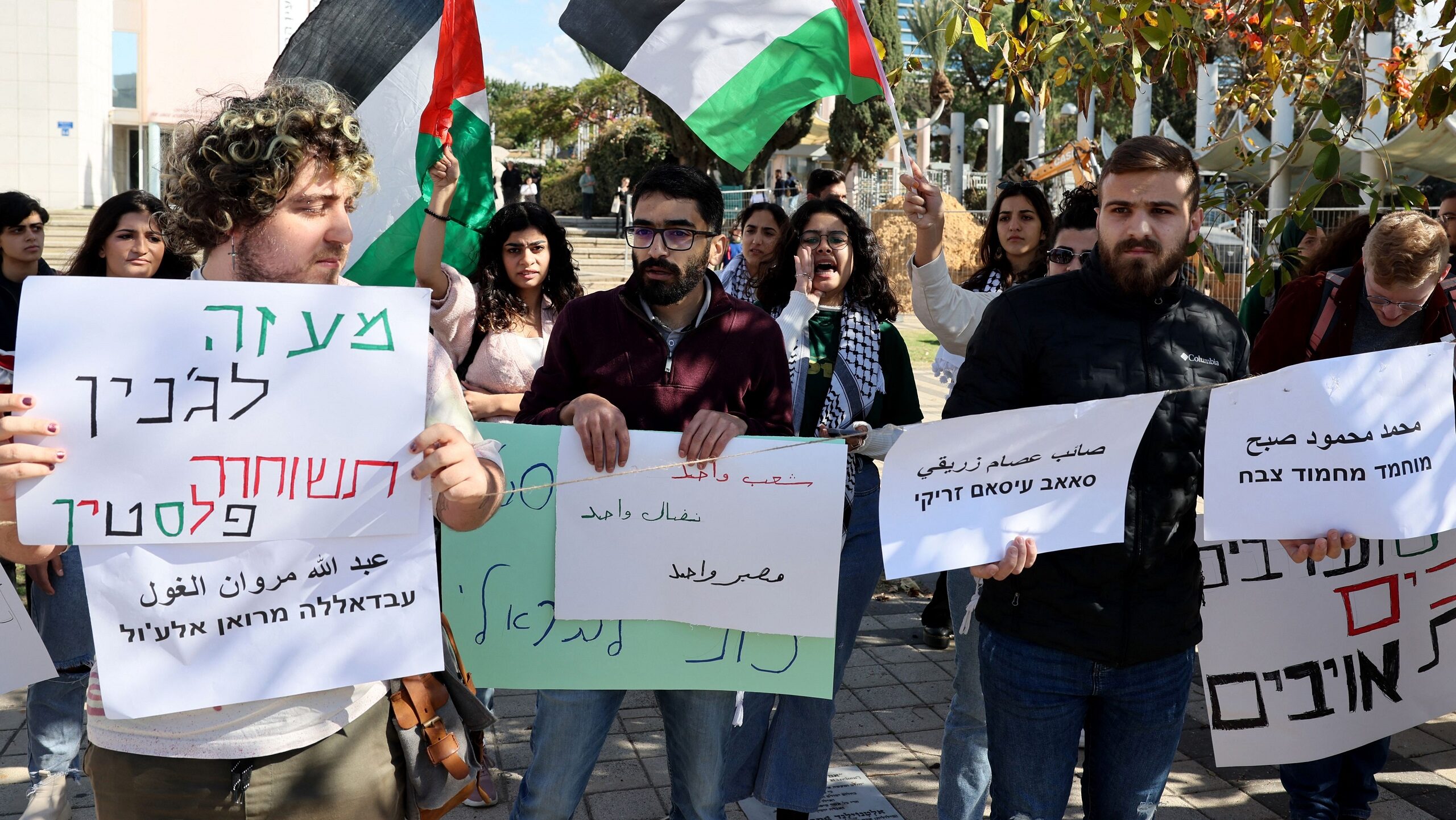Tensions Among Israeli Arab, Jewish Students Escalate Amid Gaza War
As the Israel-Hamas conflict continues, academic institutions grapple with how best to support and protect their diverse student bodies
On the evening of October 28, Jewish residents of Netanya accused Arab students from Netanya Academic College of throwing eggs at a synagogue and disrupting prayers. After the event, tensions heightened, culminating in a protest outside a dormitory where Arab students live.
Inside the building, Arab students awaited police intervention while some Jewish residents outside chanted, “Death to Arabs!” Police dispersed the protest without any reported injuries.
We had prepared for worst-case scenarios but didn’t anticipate a situation where our Arab students faced the possibility of getting hurt
Yousef Tah, a member of the newly formed Joint Arab Authority for Student Blocs under the Arab Emergency Committee, described the attack on Arab students in campus dorms as unexpected.
“We had prepared for worst-case scenarios but didn’t anticipate a situation where our Arab students faced the possibility of getting hurt,” Tah told The Media Line.
Tah advised the students to contact group members for legal assistance if questioned about the night’s events.
The message has been translated from Arabic to English:
Our Dear Students of Netanya College,
Firstly, thank God for your safety, all of you who were in the student residences this evening during the racist attack that targeted Arab students, and we wish you to reach your homes safely.
We in the Joint Arab Authority for Student Blocs (a body formed with the aim of protecting students and supporting them in the recent circumstances under the Arab Emergency Committee that includes all student movements in universities) are fully prepared to assist and support students in these challenging times. Our door is open for anyone seeking help to navigate through the current crisis.
Incitement against our students in Netanya is unacceptable and the accusations are false. If you are questioned or summoned for hearings, please contact us for legal advice. Together, we can protect our students from ongoing incitement across educational institutions.
Collecting your testimonies about conditions and attacks is crucial for us to halt these incidents, amplify your voice, and legally hold the aggressors accountable. With this, we also ask you to communicate with us to document what happened. As for the mayor’s video, there is follow-up by all political and legal frameworks, and steps will be taken in this regard.
With utmost respect and appreciation, we wish you safety.
The Joint Arab Authority for Student Blocs
The incident highlights one of many concerns both Arab and Israeli students may encounter as they resume university studies this winter.
Before this interview, numerous deans and faculty members from Israeli universities and colleges declined to discuss potential or current challenges arising from this time of war.
Prof. Tova Hartman, the dean of the faculties of Social Sciences and Humanities at Ono Academic College, addressed the important measures and concerns that her college is taking to ensure the safety of students and faculty members.
“So many people are being challenged now, and one of our challenges … would be, how do we come together and study together at this time,” Hartman told The Media Line via Zoom.
When questioned about safety measures for students, she highlighted the steps taken by campus security.
“I think one of the basic challenges is safety. We have developed a whole network where students and faculty can call, where they can come to us with some kind of intervention. We’ve just enlarged the whole part of student support,” she said.
I will not allow Hamas to win and create enemies where there shouldn’t have been, and where there aren’t
Apologizing for feeling the need to state something political, Hartman said the following regarding Hamas: “I will not allow Hamas to win and create enemies where there shouldn’t have been, and where there aren’t. I will not allow Hamas to tell me or say that there is not going to be a future where all our students will sit around a table and say we are students together.”
The Media Line interviewed both Palestinian students with Israeli citizenship and Israeli Jewish students from various universities and colleges in Israel. The students requested to remain anonymous due to the fear of getting expelled or being under observation by their academic faculties for expressing their opinions.
Arab students at Israeli institutions voiced concerns about being monitored on social media for showing solidarity with Gazan civilians.
A 25-year-old Azrieli College student told The Media Line, “I joined a group chat on Telegram, where it would share the news on what’s happening during the war, and what people are posting. They were sending screenshots of students who had their profile pictures as a black background on social media to stand in solidarity with the people in Gaza who died in the Al-Ahli hospital attack, but they associated the black background as standing with Hamas, which is not the case,” he stated.

The message says: Attention: The Arabs of Um al-Fahm and others changed their pictures on social media to black (aswad). Indeed, aswad on all of these treacherous pigs. Whoever changes their photo identifies with ISIS Hamas in Gaza.
Echoing these feelings, a 22-year-old student at the Technion—Israel Institute of Technology in Haifa spoke of the unfairness faced by Arab students who cannot openly express solidarity.
“To be honest, it doesn’t seem fair. We deeply care about our people and want to express our sympathy for Gazan civilians. It’s vital to understand that we Arabs also deserve freedom of speech. We should be allowed to share our message,” he emphasized.
A 23-year-old student from Ono Academic College described an incident in which classmates posted provocative messages in a WhatsApp group. Fearing being labeled as a Hamas supporter, she chose not to respond.
“I noticed a classmate’s WhatsApp photo showing Gaza with a ‘no’ symbol over it. What she posted in the chat was hurtful. What’s even more frustrating is that I can’t respond. If I did, they might record my details and label me a terrorism supporter, which I’m not,” she shared with The Media Line.

First text bubble: And let them know that we are not moving anywhere until these fu**ing Hamas are gone.
Second and third text bubbles: Only Hamas? Why not all of them?
Fourth and fifth text bubbles: One moment, this letter is not from the IDF headquarters.
Sixth text bubble: For me, they are all Hamas, my sister.
A 23-year-old Arab student from Hadassah Academic College emphasized the importance of utilizing WhatsApp group chats for academic purposes. However, he noted that some members shared content that might provoke Arab students in the group.
“In a WhatsApp group named ‘Biotechnology Year 2,’ Israeli students changed the group icon to the Israeli flag and renamed it ‘Biotechnology—Israel will win!’ They started sharing pictures of Israeli flags and links for purchasing firearms, even with Arab members present,” he shared with The Media Line.

In a biotechnology group renamed “Biotechnology—Israel will win!” someone posts a link to a government website for requesting a gun license.
While Arab students voiced concerns about content on social media, its monitoring, and censorship, Israeli students were anxious about their safety returning to campus this winter.
A 25-year-old Israeli student at the Hebrew University of Jerusalem said that while there’s been minimal political tension between Arab and Israeli students, his primary worry is security.
“To be honest, in our group chat there were no political debates or fights happening. It remained very calm. The change that is expected might be increasing security within the campus to ensure that everyone is safe, and they need to bring security with experience. The only thing that is scary is where the Mount Scopus campus is located, which isn’t in the safest place,” this student told The Media Line.
A 29-year-old reservist in the Israeli army, also from the Hebrew University, felt that if students return to campus, the sensitive nature of the ongoing conflict could lead to violence between the groups.
“First and foremost, there is going to be less tolerance for political protests at the university. There will also be more violence when each side is tempted. Right now, I don’t think the answer to any remarks that will be said is going to be a simple answer on WhatsApp; it’s going to end up in violence between both sides,” he told The Media Line.
The Hebrew University has a history of permitting political protests during tumultuous times. Following the death of Palestinian journalist Shireen Abu Akleh, Palestinian students demonstrated between classes, decrying what they termed Israel’s “assassination” of the journalist.
Referring to this scenario, a 27-year-old from Hebrew University believed that the institution should curb on-campus political protests to minimize tensions.
“I feel like there will be noticeable changes; there is going to be a rise in racism between both sides. The university is an extremely political university, and it has been extremely supportive of political protests on both sides in the past. I think if they were smart enough, they wouldn’t allow any political protests to break out. The security of the students should be their top priority,” she told The Media Line.
I wouldn’t feel safe inside the walls of the university, and I wouldn’t feel safe outside the walls of the university
She further shared her primary fear: venturing outside during the war.
“I wouldn’t feel safe inside the walls of the university, and I wouldn’t feel safe outside the walls of the university,” she said.
In the college, I sense no tension between Arab and Israeli [Jewish] students; we’re all friends. But I anticipate increased security upon our return.
Contrastingly, an Israeli student at the Academic College of Tel Aviv-Yaffo felt there were no significant issues between Arab and Jewish students.
“In the college, I sense no tension between Arab and Israeli [Jewish] students; we’re all friends. But I anticipate increased security upon our return. While I hope for no tensions, it’s a natural occurrence in these situations,” the student told The Media Line.
Lana Ikelan is a recent graduate of the Hebrew University of Jerusalem and an intern in The Media Line’s Press and Policy Student Program.


